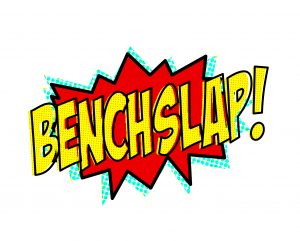Judge Tries His Hand At Comedy And Earns Comical Benchslapping
This seems like a paradox.
 Recently I had occasion to revisit an old story where I took a judge to task for running his courtroom like his personal stand-up set. As I said at the time, “[w]hen judges use their courtrooms to work on their f**king comedy set while sending people to jail, then is anything really contemptuous?” It’s not that judges can’t show a little personality — frankly, they should — it’s that there’s a time and a place and when judges sit at the wrong end of a wicked power imbalance, that’s… not the time or place.
Recently I had occasion to revisit an old story where I took a judge to task for running his courtroom like his personal stand-up set. As I said at the time, “[w]hen judges use their courtrooms to work on their f**king comedy set while sending people to jail, then is anything really contemptuous?” It’s not that judges can’t show a little personality — frankly, they should — it’s that there’s a time and a place and when judges sit at the wrong end of a wicked power imbalance, that’s… not the time or place.
This brings us to what may seem to be a jurisprudential paradox. The Utah Supreme Court issued an opinion affirming the suspension of a trial judge and included a reminder that judges aren’t funny in a footnote that is, itself, hilarious:
Judge Kwan contends that this was intended to be funny, not rude. It is an immutable and universal rule that judges are not as funny as they think they are. If someone laughs at a judge’s joke, there is a decent chance that the laughter was dictated by the courtroom’s power dynamic and not by a genuine belief that the joke was funny.

Is The Future Of Law Distributed? Lessons From The Tech Adoption Curve
Yet the footnote written by Justice John A. Pearce — who is, despite this “immutable and universal rule” notably quite funny — isn’t a paradox at all. A quip in a written opinion doesn’t play off the power dynamics of enforced obsequiousness brought on in a courtroom setting.
Beyond the benchslappy footnote, the case itself is a curious one. Judge Michael Kwan has served as a judge in Utah for two decades now, but he finds himself on the wrong side of disciplinary opinions largely because he can’t help himself from taking swipes at Donald Trump. Indeed, the “joke” that spawned the footnote above comes from an exchange with a defendant who couldn’t pay his fines and suggested that he might have more money after tax season:
Judge: Ok. Prayer might be the answer. ‘Cause, he just signed an order to start building the wall and he has no money to do that, and so if you think you are going to get taxes back this year, uh-yeah, maybe, maybe not. But don’t worry[,] there is a tax cut for the wealthy so if you make over $500,000 you’re getting a tax cut. You’re right[] there[,] right? Pretty close? All[]right, so do you have a plan? Other than just get the tax cut and pay it off?1
Judge Kwan feels this is his constitutional right and shouldn’t make him the subject of disciplinary action, which is an interesting argument, but unfortunately one that the Utah courts have already decided was beyond the purview of a disciplinary hearing.
Sponsored

Navigating Financial Success by Avoiding Common Pitfalls and Maximizing Firm Performance

Is The Future Of Law Distributed? Lessons From The Tech Adoption Curve

Legal AI: 3 Steps Law Firms Should Take Now

Navigating Financial Success by Avoiding Common Pitfalls and Maximizing Firm Performance
On the one hand, political speech is different than yukking it up over the idea of jailing indigent defendants like the subject of the prior story. On the other hand, in deep red Utah, making these comments about Trump’s tax plan — though completely accurate — probably frighten defendants worried that the judge is out to get them.
But in a world where many jurisdictions elect judges, why would expressing a political opinion be wrong? When judges campaign on being “tough on crime,” that’s no less political or off-putting to a future defendant. The instant procedural posture may not have offered the appropriate forum to litigate the judge’s constitutional questions, but it’ll be interesting to see how this shakes out.
(Read the whole opinion on the next page.)
Earlier: The Most Insane Wrongful Conviction But, Really, ‘Right’ Conviction Story Ever
Unprofessional Judge Calls Public Defender Unprofessional
Sponsored

Early Adopters Of Legal AI Gaining Competitive Edge In Marketplace

The Business Case For AI At Your Law Firm

 Joe Patrice is a senior editor at Above the Law and co-host of Thinking Like A Lawyer. Feel free to email any tips, questions, or comments. Follow him on Twitter if you’re interested in law, politics, and a healthy dose of college sports news. Joe also serves as a Managing Director at RPN Executive Search.
Joe Patrice is a senior editor at Above the Law and co-host of Thinking Like A Lawyer. Feel free to email any tips, questions, or comments. Follow him on Twitter if you’re interested in law, politics, and a healthy dose of college sports news. Joe also serves as a Managing Director at RPN Executive Search.







